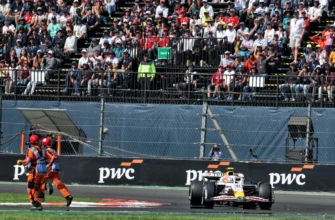Formula 1 is set for further discussions regarding a potential late change to the 2026 power unit regulations, a proposal that Mercedes boss Toto Wolff controversially labelled as `a joke`.
At the recent F1 Commission meeting held on Thursday, discussions took place among next year`s engine suppliers about potentially decreasing the amount of electrical energy used in the 2026 technical regulations.
Although a vote on the matter was anticipated, it did not proceed. Approval for the proposed change would require agreement from four out of the five currently involved engine manufacturers: Mercedes, Ferrari, Red Bull-Ford Powertrains, Audi, and Honda.
The FIA stated: “The F1 Commission discussed in principle refinements to the energy management strategy for 2026, as well as measures to address financial issues that can be faced by Power Unit Manufacturers that experience either low performance or significant reliability issues in 2026.”
They added, “All of these topics will be discussed in more detail among the specialists in the appropriate advisory committees.”
The forthcoming 2026 regulations are designed to feature a 50-50 power distribution between the internal combustion engine and the electrical system.
Compared to the current power units, which use around 20 per cent electrical power, the 2026 rules represent a substantial increase in electrical contribution.
The specific proposed change, however, would reduce the electrical motor`s power output during races from 350kW to 200kW, shifting the balance towards a 60-40 split favouring the combustion engine.
The rationale behind this proposed adjustment stems from concerns that drivers might deplete their battery energy on circuits with long straights, potentially forcing them into `lift and coast` behaviour (lifting off the throttle early before braking zones) to conserve power.
The F1 Commission meeting in Geneva also included discussions about exploring alternative materials for the cars` skid blocks to mitigate the risk of grass fires, such as those seen during the Japanese Grand Prix weekend when sparks ignited the trackside grass.
Toto Wolff: Proposal is `a joke` | Other team bosses `open` to the idea
Mercedes is widely considered to have made significant progress in preparation for the 2026 regulations, which represent one of the most substantial technical overhauls in F1 history.
A prior meeting held earlier this month specifically discussed 2026 and future power unit regulations, concluding with an agreement not to introduce any changes for the immediate next season (2025).
Team principals were asked for their views on the proposal after the Saudi Arabian Grand Prix, just ahead of Thursday`s scheduled vote, and Wolff did not mince words.

He stated, “Reading the agenda of the F1 Commission is almost as hilarious as reading some of the comments that I see on Twitter on American politics.”
Adding, “I really want to protect ourselves and make no comment, but it`s a joke. A week ago, there was an engine meeting and then things like this end up on the agenda again.”
Formula 1 Teams and Engine Suppliers for 2026
| Team | Engine |
| McLaren | Mercedes |
| Mercedes | Mercedes |
| Red Bull | Red Bull-Ford |
| Ferrari | Ferrari |
| Williams | Mercedes |
| Haas | Ferrari |
| Aston Martin | Honda |
| Racing Bulls | Red Bull-Ford |
| Alpine | Mercedes |
| Audi | Audi |
| Cadillac | Ferrari |
Red Bull is embarking on a new era, developing their own Red Bull Powertrains engine in collaboration with Ford.
Christian Horner commented that the proposal was “pretty sensible” but felt it was something that should have been addressed “two years ago”.
He noted, “Mercedes seem pretty confident with the job they have done [preparing] for next year,” implying confidence in their 2026 preparations.

Horner added, “This is something that we asked to be looked at two years ago, and it`s not something that we`ve pushed to be on the agenda this week at all.
He explained the FIA`s perspective: “The FIA have gone away and done their research, and I think what they want to desperately avoid is a lot of lifting and coasting in the Grand Prix itself, which is going to be not particularly good for the sport and hugely frustrating for the drivers.
“It`s not something that we`ve lobbied for or asked for,” Horner concluded, “and if they`re doing it in the interest of the sport, then you`ve got to support it.”
Ferrari team principal Frederic Vasseur and McLaren team principal Andrea Stella both indicated they were `open` to considering the proposal.

Vasseur commented: “We have to be open with this and avoid to start to fight because we think that `we have an advantage on the battery` or whatever. This could be the worst case scenario for F1.”
He stressed the scale of the change: “It`s true that we are at a corner with the regulation. If you look at the last 25 or 30 years, we never had such a big change in the regulation.
“It`s the first time that we are doing chassis, engine, sporting at the same time,” Vasseur continued. “It`s a challenge for the teams. It`s a challenge for the FIA.”

Stella articulated his view: “My opinion is very clear. The principle I want to state very strongly is that it is a responsibility of all the stakeholders to make sure that the 2026 regulations are successful because there`s no point in teams competing with each other if we don`t have a good sport.
“The quality of the sport, the quality of the spectacle, the quality of racing is a function of the product,” he added.
Stella concluded: “From a chassis and power unit point of view, so I think keeping the conversation open, that we really go into the details, considering overtaking, considering power deployment, considering power harvesting, everything that determines the quality of the product, therefore of the spectacle and therefore the health of the business, we should look into that and we shouldn`t say it`s frozen.”






